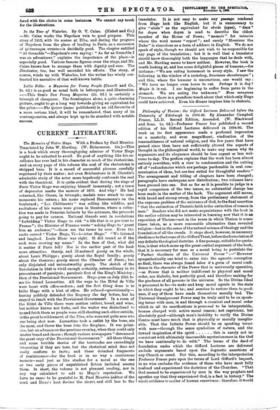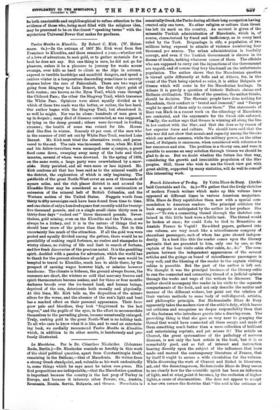Philosophy of Theism: the Gifford Lectures Delivered before the University
of Edinburgh in 1894-96. By Alexander Campbell Fraser, LL.D. Second Edition, Amended. (W. Blackwood and Sons. Gs. 6d.)—Professor Fraser has published a second edition of his Gifford Lectures delivered in 1894-96. The work on its first appearance made a profound impression as a masterly, and even magnificent, vindication of the reasonableness of natural religion, and the few years that have passed since then have not sufficiently altered the aspects of thought in the philosophical world, to make any reason why its arguments and its eloquence should be less cogent or less wel- come to-day. The preface explains that the work has been almost entirely rewritten, with a view to condensation and the cutting off of "redundancies which are perhaps pardonable in oral com- munication of ideas, but are less suited for thoughtful readers " The arrangement and titling of chapters have been changed; paragraphs have undergone new distribution ; two volumes have been pressed into one. But as far as it is possible to judge in a rapid comparison of the two issues, no substantial change has been made in the matter of the book. The argument still moves, with broad and strong sweep, from the preliminary statement of the supreme problem of the existence of God, to the final assertion that the extinction of Theistic faith is the extinction of reason in man." Readers who did not make acquaintance with the book in the earlier edition may be interested in learning now that it is an exposition of Theism—not in the sense in which Theism is some- times taken, as a more reasonable alternative than revealed religion—but in the sense of the natural science of theology and the foundation of all the creeds. It stops short, however, in necessary obedience to the terms of the Gifford Trust, before the formulation of any definite theological doctrine. A fine passage, suitable for quota- tion, is that which sums up the great central argument of the book, that it is necessary for man as a moral being to postulate the " Perfect Goodness of the Universal Power " :—" However sympathetically one tried to enter into the agnostic conception as final, there was always found below it a germ of moral confi- dence in the character of the Power that is universally operative, —as Power that is neither indifferent to physical and moral order, nor diabolic, but perfectly good, and therefore making for the goodness of all persons in the universe. So the Divine Ideal is presumed to be—to make and keep moral agents in the state in which they ought to be; and somehow to restore them to good- ness, if any of them have made themselves morally bad. The Universal Omnipresent Power may be truly said to be on speak- ing terms with man, in and through a cosmical and moral order which in all its ramifications is presumed to be interpretable, because charged with active moral reason; not capricious, but absolutely good—although man's inability to verify the Divine Centre must leave much that is physically or morally inexplic- able. That the Infinite Power should be on speaking terms with man—through the sense symbolism of nature, and the inward inspiration of the spirit this is surely not in- consistent with ultimately inaccessible mysteriousness in the God we have continually to do with." The terms of the deed of foundation under which the Gifford Lectures are delivered exclude arguments based upon the dogmatic assertions of any Church or creed. But this, according to the interpretation Professor Fraser puts upon the terms of Lord Gifford's bequest, in no wise excludes the evidence of those who have most fully realised and experienced the doctrines of the Churches. "That God seemed to be experienced by men in the way prophets and apostles say that they experienced God, is a fact in history." The whole evidence is matter of human exoerience : therefore. it would
be both unscientific and unphilosophical to refuse attention to the evidence of those who, being most filled with the religious idea, may be presumed to be on the closest " speaking terms " with the mysterious Universal Power that makes for goodness.























































 Previous page
Previous page